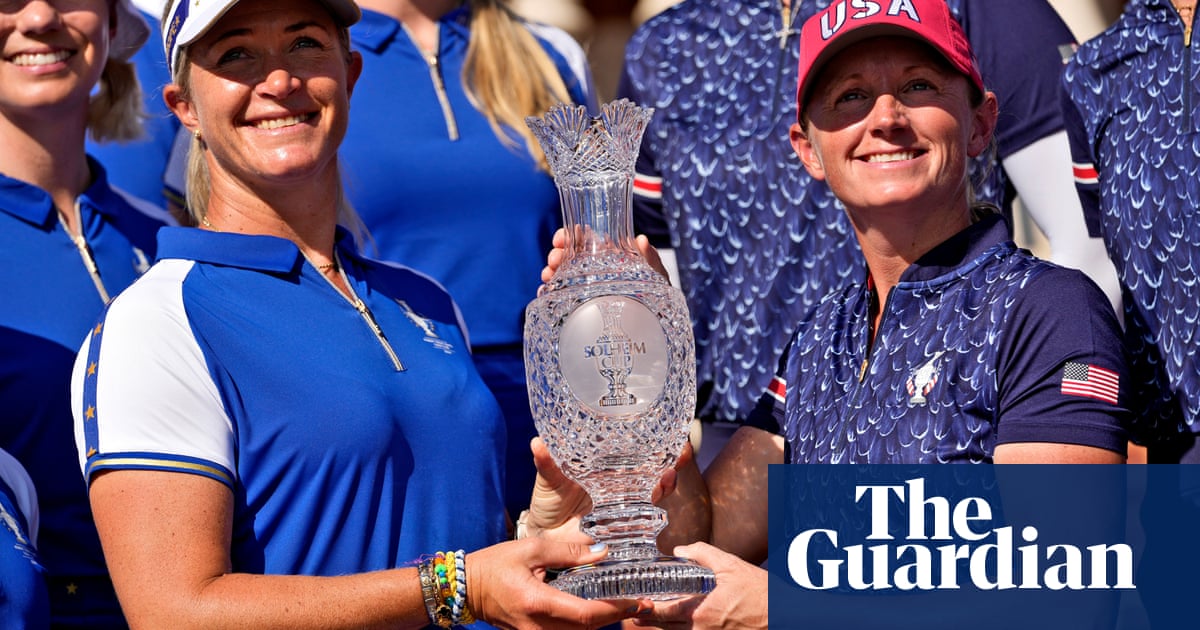Golf
Solheim Cup’s controversy and close contests are what modern golf needs | Ewan Murray

The Solheim Cup’s propensity to deliver drama remains its most endearing attribute. There was European rage in 2000 as Annika Sörenstam was accused of playing out of turn at Loch Lomond. Alison Lee was reduced to tears after an infamous clash with Suzann Pettersen in 2015. Madelene Sagström was in the same condition after picking up Nelly Korda’s ball, too quickly, six years later. In 2013, an epic row broke out over a European penalty drop. Golf’s routinely anodyne world changes tack at Solheim Cups.
Wednesday saw the latest example of friction. Stacy Lewis, the US captain, referred to “issues” with the European base, a house that backs on to the practice range. “Their team room kind of exploded on to the driving range a little bit,” said Lewis. “But we reeled it in. It’s all good. We adjusted the way the range was set up a little bit and moved the US team further down so Europe could do what they wanted basically.
“Our players were warming up and they’re there eating breakfast and talking. We were just trying to get everybody some space so they didn’t have to listen to them eating breakfast. That’s all.” Ding ding.
Close contests also set this apart from the Ryder Cup. When the women of the United States and Europe meet, the outcome tends to be defined by small margins. In four of the last five Solheim Cup stagings, the biggest victory was by two points. In the Ryder Cup, comprehensive home wins have become the mundane norm behind the noise attached to that event.
The Solheim Cup’s sharp growth will be demonstrated by the appearance of more than 100,000 spectators at the Robert Trent Jones Golf Club. Attendance and revenue records are expected to be smashed in Virginia. “From Lake Nona in 1990, there’s no comparison to what it is now,” said the Solheim Cup veteran Laura Davies. “The infrastructure, the support the teams get now, it’s a world-class sporting event. I personally think it’s probably the best women’s world event in sport.
“The drama of the last four or five cups has been incredible and it’s on the world stage now. People want to watch it. People want to come. We’ve heard the numbers that are coming this week. Back in 1990, there were probably 30, 40 people watching, and you had some of the best golfers in LPGA history, Nancy Lopez, Pat Bradley. It just didn’t have this gravitas that it has now.
“But it had to start somewhere. The foresight of the Solheim family, how they thought of it. It was an obvious fit with the Ryder Cup getting stronger and stronger but they were the ones that stepped up. They’ve created a monster and it’s great fun to be involved in it.”
Not that Sky Sports appears to have noticed; the arrival of a skeleton staff from the UK offers a dispiriting glimpse of where the Solheim Cup sits when placed against the broadcaster’s kitchen sink approach to the male equivalent.
In sporting terms, the US need to win after watching the trophy lifted by Europeans three times in a row. The 14-14 scoreline in the last tussle was particularly sore for Lewis and the US given they led 4-0 after one session. The strength of the home team means it will be a serious shock if Pettersen’s team prevail again. This staging marks an inevitably emotional playing farewell for Lexi Thompson who, at 29, will shortly call time on a career which is widely regarded as having elevated the status of women’s golf.
In respect of the broader scene, this Solheim Cup is almost certain to be an improvement on Finca Cortesin a year ago. In Spain, awful logistics for spectators would have become a bigger story had action inside the ropes not been so breathtaking.
Quick Guide
Donald ‘very happy to hear’ Rahm has appealed fines
Show
Luke Donald, the Europe captain, has welcomed Jon Rahm’s decision to appeal against his fines for defecting to LIV Golf and remain eligible for the Ryder Cup.
In order to play DP World Tour events, Rahm either had to pay his fines or appeal against them before entries for the Spanish Open closed at noon on Wednesday.
The two-time major winner did so just in time to be included in the Spanish Open field and also plans to contest the Dunhill Links Championship and Andalucía Masters to fulfil his DP membership requirements.
“From my standpoint, very happy to hear he made that decision,” Donald said. “I know he was sitting on the fence a little bit.” PA Media
There has never been any synchronisation between the Solheim and Ryder Cups, which given golf’s fractured state feels a pity. Saudi Arabia has propped up the Ladies European Tour with the addition of the Aramco Series.
Prize funds there compare favourably with other non-major tournaments. What is striking is that Saudi involvement in women’s golf has arrived without anything like the controversial backdrop to the kingdom marching into the male golf sphere. In the US, the individual circuit remains highly lucrative; there is no prize purse on the LPGA Tour worth less than $2m (£1.5m) for the remainder of the year, post-Solheim.
Angela Stanford, now a US vice-captain, first played in the Solheim Cup in 2003. “The depth of each team has gotten better and better,” she said. “Each time I leave a Solheim Cup, it’s like: ‘How are we going to beat that? How do they keep making it better and better?’”
Fireworks are guaranteed. The Solheim Cup is the addictive team battle golf requires more than it realises.










